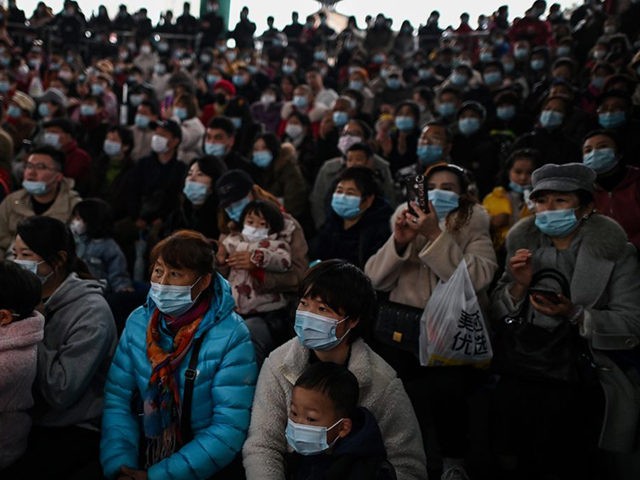China’s Global Times, a newspaper published by the government, dismissed Thursday the widely accepted consensus that the Chinese coronavirus originated in Hubei province, China, as a “conspiracy theory” that did not deserve free speech safeguards.
The first cases of Chinese coronavirus infections in human beings were documented in Wuhan, the capital of Hubei, in late 2019. No evidence exists suggesting that any cases of human infection were documented before November 17, 2019, the date leaked Chinese government documents reportedly listed as that in which doctors confirmed the first Wuhan case.
Beijing has publicly only accepted that cases existed within its borders as of December of that year, arguing that evidence of cases in places like Italy, which has a high concentration of Chinese immigrants, before December suggest a foreign origin for the novel coronavirus. The Chinese Communist Party has also increasingly pressured the World Health Organization (W.H.O.) to launch an investigation into the United States as the origin nation of the virus, despite no evidence suggesting that the first infections occurred there.
The Global Times described believing China is the home nation of the Chinese coronavirus as a “conspiracy theory” in an article condemning criticism of the Communist Party — particularly its poor handling of the pandemic and its ongoing genocide campaign against the Uyghur people of western Xinjiang — in Australia. The Times dismissed any concerns about human rights under the Han supremacist regime as inherently discriminatory and sensationalist.
“Is it racism to criticize China, or freedom of speech? Rising racial discrimination against Asians has sparked a debate on the issue in Australia,” the Times noted. “However, whether people have the freedom to criticize China or not is not a problem. The issue is, in Australia, there are smears and rumors against China, and Canberra has been an active part of them.”
Free speech concerns aside, it alleged, “there is still a clear boundary between information and disinformation.”
“A disinformation campaign launched by some Western media and elites, including conspiracy theory that COVID-19 [Chinese coronavirus] originated in China and China’s governance in Xinjiang is ‘genocide,’ are groundless rumors,” the article insisted. To defend its first point, the Global Times cited the W.H.O. published in March on the results of an agency visit to Wuhan and investigation into the origin of the virus.
The report concluded the likeliest path to human infection was that an infected animal spread the virus to a second animal that then came into contact with humans. It stated that the least likely hypothesis investigated was an accidental leak at the Wuhan Institute of Virology, a laboratory known to have been studying coronaviruses at the time of the outbreak. The report also speculated there was a non-zero, though not major, chance that the virus entered Wuhan through animal meat shipped from elsewhere.
The W.H.O. investigation occurred in early 2021, a year after Chinese officials admitted to destroying early samples of the virus, making studies into its evolution impossible. At the press conference to announce the publication of the report, Director-General Tedros Adhanom Ghebreyesus condemned China for keeping important data from the investigative team and urged further investigation into the lab leak theory.
“The team also visited several laboratories in Wuhan and considered the possibility that the virus entered the human population as a result of a laboratory incident,” Tedros said. “However, I do not believe that this assessment was extensive enough. Further data and studies will be needed to reach more robust conclusions.”
“Although the team has concluded that a laboratory leak is the least likely hypothesis, this requires further investigation, potentially with additional missions involving specialist experts, which I am ready to deploy,” he offered.
While the Global Times initially reacted to Tedros’ remarks by accusing him of “appeasing Washington,” on Thursday it appeared to interpret the aftermath of the W.H.O. investigation into Wuhan as being a definitive conclusion that the virus did not originate in China. The text of the W.H.O. report does not in any way dismiss the entirety of the Chinese nation as a potential origin source for the virus, or even Wuhan city.
“The World Health Organization-China investigation has suggested broader probe on virus origins in more countries after their probe in China, yet Australia joined the US and 13 other countries to question the W.H.O. report,” the Global Times claimed, referring to calls from the latter nations for more scientific research.
W.H.O. experts have indeed not fully dismissed the possibility that the Chinese coronavirus originated elsewhere. The experts have not, however, fully discarded the possibility that the virus originated where the first infections occurred. Notably, biologist Hung Nguyen-Viet, a member of the W.H.O. Wuhan team, suggested that the virus may have come from farms in southern China, which would explain the absence of any cases of animals carrying the virus in the wild in Hubei.
The Chinese Foreign Ministry has spent much of the past year attempting to make the case that America is the true source of the virus. Foreign Ministry spokesman Zhao Lijian has repeatedly accused the U.S. Army of causing the pandemic, without providing any evidence. Colleague Hua Chunying has suggested that American doctors misdiagnosed cases of coronavirus as lung injuries from the use of e-cigarettes or vapes — often the product of using unregulated products manufactured in China. Hua has never explained how that could be possible given that injuries, unlike coronavirus infections, are not contagious, and no evidence suggests vaping lung injuries are an exception to that rule.
The Global Times ultimately lamented that free speech concerns over censorship of criticism of the Communist Party in Australia were “very hypocritical and ridiculous.”

COMMENTS
Please let us know if you're having issues with commenting.